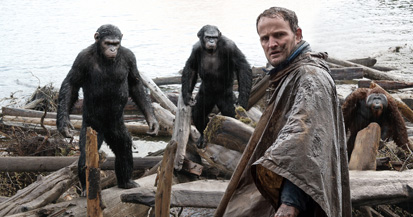Review: Dawn of the Planet of the Apes
By Matthew Huntley
July 16, 2014
Dawn of the Planet of the Apes is a rich, artistic and often heartfelt blockbuster. These days, such a statement might seem oxymoronic, especially when a movie like Transformers: Age of Extinction rules the box-office. But Apes, along with Godzilla and X-Men: Days of Future Past, reinvigorates us with hope that mainstream films can still be relevant and good, or in this case, very good. It reiterates the simple notion that when a movie’s essential narrative elements are given proper weight and attention, they can collectively yield an intellectual, emotional and, above all, entertaining experience.
The film is the sequel to Rise of the Planet of the Apes (2011), itself the first prequel to Planet of the Apes (1968). This may be a little confusing, but all you need to know, and probably what you already know, is that in the future, Earth is taken over by apes who displace humans as the ruling party. They become hyper-intelligent, learn to talk and start treating humans as the inferior species. Rise of the Planet of the Apes, and now Dawn, set out to explain how this happened.
Rise, you might recall, ended with the apes, led by the first intelligent one of their kind, Caesar (a motion-captured Andy Serkis), storming a revolt through San Francisco and establishing an apes-only residence in the forest. The opening of Dawn also reminds us a fatal virus was released into the general population that quickly spread across the planet, rendering it a dreary and near human-less dystopia. Ten years have now passed and only those genetically immune to the virus - and those lucky enough to survive the ensuing civil unrest - remain.
A small colony of human survivors still lives in San Francisco, not far from Caesar and his growing clan of faithful simians, who remain cautious of humans and their high-tech weaponry. Leading the humans are the sensible Malcolm (Jason Clarke) and the more impetuous Dreyfus (Gary Oldman). Both men have lost a great deal since the violence and mayhem broke out, but Malcolm has since found love with Ellie (Kerri Russell) and has a son (Kodi Smit-McPhee), both of whom make him more willing to listen to reason. He inadvertently leads a group into Caesar’s territory while seeking a dam that could potentially serve as a source for electricity.
But the apes, many of whom were previously caged or experimented on, don’t take kindly to humans, especially when they appear to be so quick with a trigger. Caesar, however, longs for peace. Like Malcolm, he has a family and doesn’t see things in terms of simple black and white. He allows the humans to conduct their work on the condition they surrender their guns. All seems to be going fine until a series of unfortunate events and misunderstandings pit the humans and apes against one another, leading to a foregone climactic battle and the start of a greater war.
Under normal circumstances, the narrative trajectory of Dawn of the Planet of the Apes would come across as standard and routine for a sci-fi action picture, but the film’s advantage is that it’s a prequel, and therefore its obligatory devices and scenes, such as character misinterpretations or an effect-laden ending, don’t come across as tiresome or hackneyed. We accept them because we know this story must eventually come full circle with the original, and we already know how that begins. Of course, it would have been really inspiring had the screenplay found a fresher and more unpredictable way of connecting the two instead of settling on the traditional action and fight scenes, but we’re willing to forgive it since these are so well-executed.
With that said, Mark Bomback, Rick Jaffa and Amanda Silver’s script does contain some arguably touching and emotional moments, which is what we really take away from the film. It takes the time to develop the primary characters, human and ape alike, beyond just their superficial motivations. For instance, there’s a particularly heartrending scene when Dreyfus gets power back on his iPad and we understand why he’s blinded by anger and grief.
On the other hand, the movie also has its fair share of stock elements (the trigger-happy drunks, for example), but they’re fortunately overshadowed by its better qualities, including the superb special effects. The digital apes are so well rendered that we immediately accept them as real and tangible. We barely, if ever, re-realize the human actors are responding to and interacting with computer imagery. What’s interesting is that a movie like Transformers has equally impressive special effects, but they mean so much more to us here because of the accompanying narrative, which further proves just how much story and effects go hand in hand.
How many more Planet of the Apes movies will be made until this modern prequel series finally catches up to the original? I guess that depends on how well they do at the box office, so perhaps the better question is how many more should be made? I’m thinking just one more ought to do it, because it’d be a real shame if the overall story line meandered and grew stale by no longer having a purpose and final destination. I would also encourage the director of this film, Matt Reeves, and the current writers, to helm it, because they obviously have a firm grasp on the material. They take it seriously and treat it with respect. An obvious social commentary is at work but it’s not forced and we walk away from Dawn feeling touched, empathetic and simply roused by the narrative and spectacle that unfolds on-screen. Wouldn’t it be something if all blockbusters had this effect?




